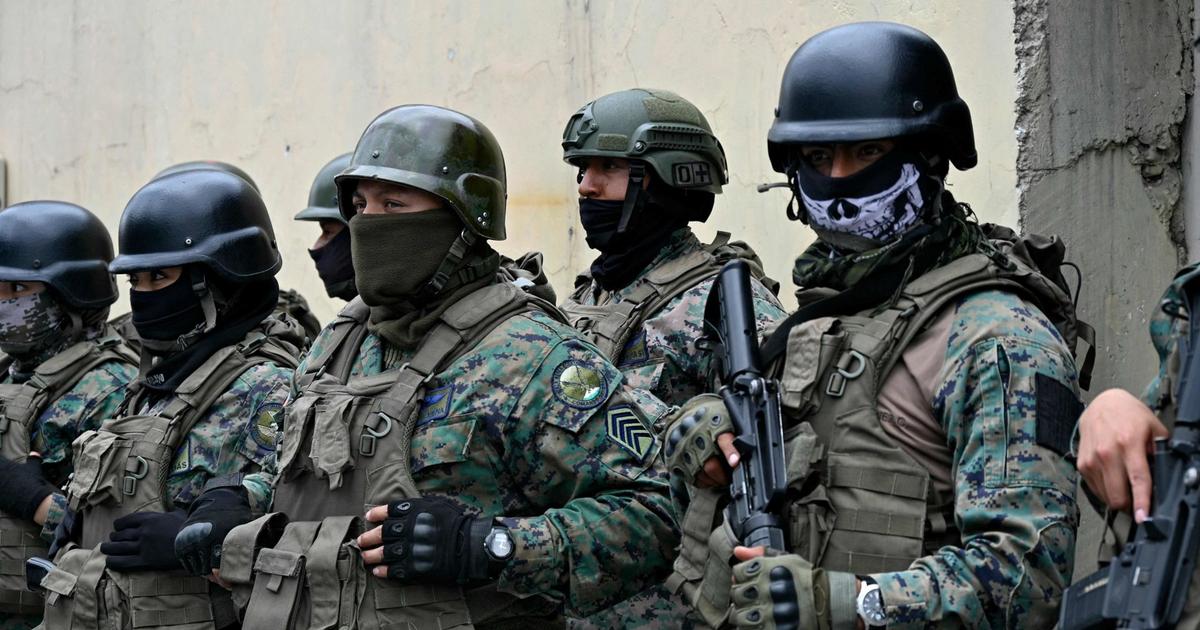The Guadalajara Book Fair is these days –and until December 4– the largest meeting of publishers, writers and readers in the world in Spanish, a good thermometer to discover what is being read on the continent.
EL PAÍS has spoken with professionals from the sector to find out what books, what authors, what genres are driving conversations in the region.
"There are all kinds of books here: self-help, literature, politics, children's, youth...", says the editor Andrés Ramírez, and other professionals consulted on this Sunday agree with him.
"The Guadalajara Book Fair reveals such an immense melting pot of interests in reading in Latin America," says the Mexican publisher.
This is an (incomplete) x-ray to discover what Latin America is reading.
“There is a great moment for literature written by women”
Fernanda Trías at the Guadalajara International Book Fair on December 1, 2021. Hector Guerrero
Several publishers and publishers who walk these days at the Guadalajara Book Fair mention, above all, female authors when asked about the most widely read books in their countries.
“We are seeing a boom, a visibility of all this production”, adds Ramírez, editorial director of Penguin Random House in Mexico, and exemplifies: “Fernanda Trías, Mariana Enriquez, Fernanda Melchor, Cristina Rivera Garza, Carolina Sanín…”.
Melanie Jösch, editorial director in Chile of the same publishing house, agrees: “There is a great moment for literature written by women.
There is a discovery, and there is also great writing.”
The editor gives the example of
Limpia
, by the Chilean Alia Trabucco.
The novel deals with "a very dramatic subject," says Jösch, "as is the reality of domestic workers who are almost slaves to a work situation."
“It says a lot about the trends in what is being read in Latin America under the wing of the feminist awakening,” says the editor.
The Spanish writer Irene Vallejo during her participation in the FIL Guadalajara.
Roberto Antillón
Lluïsa Matarrodona, coordinator of Anagrama in Mexico, acknowledges, however, that "it is very difficult to position the new".
"The authors have more hit, but it is still a small audience," she warns.
The general manager of the Mexican publishing house Almadía, Ariana González, explains a "recurring" phenomenon that has boosted the sales of the authors they publish, such as Clyo Mendoza, Jazmina Barrera or Andrea Chapela.
"The writers generate a lot of word of mouth, they become a bestseller because the readers like it and recommend it," says González.
Even in "difficult" genres such as poetry: "We have two young poets, Isabel Zapata and Yolanda Segura, who sell a lot [for that reason]."
On the border of “the traditionally literary”
The writer Joana Marcús, one of the best sellers on the continent, brought together more than 1,000 people on the first day of FIL, this Saturday, for the presentation of her book
Before December
.
The Mallorcan author, who was born in 2000, published her first story on a social network at the age of 13 and has since become a bestseller.
Last year, another author, the Mexican Flor Salvador, received a similar reception at FIL.
“There is a great interest in the new generations, in reading and writing.
There is a phenomenon of young female writers who are finding their way”, says Andrés Ramírez, editorial director of Penguin Random House in Mexico.
These books were written on a platform called Wattpad, the world's largest narrative social network.
"These are books that border, let's say, the traditionally literary," says Ramírez.
The Spanish writer Joana Marcús, at the Guadalajara International Book Fair, on November 26, 2022. Roberto Antillon
The moment of non-fiction
Beyond the literary phenomena of the moment, the genres that fall within non-fiction are currently the ones that are sweeping bookstore sales.
In Gandhi's post within the FIL, mountains of books appear as witnesses of what moves the market.
Hundreds of piled up editions of scientific, self-help and political diffusion, which at the end of the fair will have been mostly sold, according to the calculations of those who attend the place.
The coordinator of Anagrama in Mexico says that in conversations she has had with other publishers in the region they agree on the idea that "non-fiction sells more right now, and literature much less."
“People are reading a lot of nonfiction, of all kinds.
More essayistic, more literary, but also more self-help”, says the editorial director of Penguin Random House in Chile.
In that country, the resurgence of non-fiction is mainly due to a boom in self-writing, explains Blanco Pantoja, director of Erdosain Ediciones.
“There is a tremendous mass of publications that is about people talking about themselves.
A lot of
coaching
, spiritualism, esotericism, ”she says.
In a large part of the countries, Matarrodona acknowledges, people are buying many books related to political and current issues.
In Mexico, the work of the journalist Anabel Hernández stands out, who has written about important figures in drug trafficking, or "all those related to the 4T", the Government of Andrés Manuel López Obrador.
“In Mexico there is a more marked interest in non-fiction, books on journalism, politics… Fiction is well consumed, but to a lesser extent.
Unlike Argentina, perhaps, where fiction is more powerful”, adds Ramírez.
Chile, rehearsals to get out of the confusion
“In Chile we had a social outbreak, then a pandemic, then a very progressive constitution that was rejected… It is a very critical moment politically, and that is why what is being read are the essays that try to explain this moment”, says the director Penguin Random House publishing house in the country.
Next year, when the 50th anniversary of Augusto Pinochet's coup d'état is celebrated, the display of non-fiction books will be even greater, the publisher anticipates, with books such as a biography on Víctor Jara by the Spanish historian Mario Amorós, who agreed to the files of the musician assassinated by the Chilean coup leaders.
The editor also points to "an incredible moment of the feminist essay."
Books like
King Kong Theory
, by Virginie Despentes, or
We should all be feminists,
by Chimamanda Ngozi Adichie, are publications whose editorial success extends over time.
In addition, other titles such as
Las theses, a feminist anthology,
made by the Chilean collective, also became a
best seller
in the South American country.
The phenomenon Mariana Enríquez
A young woman looks for Mariana Enriquez's books at the FIL.
Hector Guerrero
The undeniable success of
Our part at night
, winner of the Herralde Novel Prize and the Critics' Prize in 2019, catapulted the Argentine Mariana Enríquez to the category of renowned writers in Latin America.
Not only did it give him the prestige that international recognition brings, but it also won him readers around the world.
Matarradona, the coordinator in Mexico of Anagrama, the publisher that carries several of her titles in the catalogue, assures that the sales of Enríquez's work have crossed the borders of Argentina and the region.
"It has been a boom that has been sold even in Spain, which is rare because there is a very real border for Latin American authors there."
Other FIL visiting editors recognize similar phenomena in the region, such as the Chilean Alejandro Zambra, the Mexican Guadalupe Nettel,
Central America no longer writes about the war
Despite the fact that Central America is going through difficult times with authoritarian governments such as that of Daniel Ortega in Nicaragua, Nayib Bukele in El Salvador, or Alejandro Giammattei in Guatemala, new young literary voices are making their way in the region exploring new genres.
It is no longer a literature entrenched in the horrors and traumas of the wars that bled the region dry or sunk in the throes of magical realism.
“It is fresh literature, with a different look,” says Claudia Neira, director of Centroamérica Cuenta, the main literary fair in the region.
“Central American literature is touching on very current issues, we are not lagging behind nor are we talking about the war, because it was like a stamp that marked Central America a lot,” explains Neira.
Among the names of this new generation of Central American writers, Neira mentions Rodrigo Fuentes (Guatemala, 1984), who in 2014 received the Central American Short Story Cover Award.
Fuentes' stories have been published in Spanish, English and French, and his new novel,
Map of Other Worlds
, plunges into the labyrinth of justice in Guatemala, a very current issue when the government of his country persecutes judges and independent prosecutors.
“As Sergio Ramírez would say, we in Central America write with an open window, because the region's literature touches on social issues, human rights, but it also immerses itself in a literary world that explores life,” says Neira.
The director of Centroamérica Cuenta also mentions Panamanian Isabel Burgos, a benchmark in her country, among the writers who are read in the region.
“She is part of a generation that has focused on the invasion of Panama by the United States, which is called invasion literature.
It is good literature, which portrays a novel subject, because now it is seen from a distance”, explains Neira.
The prize drive
The international recognition of the literary prizes has been a factor in promoting or promoting some books or authors in the region.
In Mexico, the writer Clyo Mendoza, author of
Furia
, received a new "levantón" from the Primera Novela prize, awarded by Amazon, says Patricia Salinas, editor of Almadía.
An even bigger boost recently received
Seven Empty Houses
, by Samanta Schweblin, whose translation into English has just won the National Book Award, one of the most prestigious in the United States and for literature in English.
“Schweblin is a well-established author, and her works are those kinds of books that will always sell.
But an award like this does raise her a lot,” adds Ariana González, general manager of Almadía, which publishes it in Mexico.
The Mexican writer Clyo Mendoza.Courtesy
The Uruguayan writer Fernanda Trías also points out the "revaluation" that two authors, Ida Vitale and Cristina Peri Rossi, after winning the Cervantes Prize.
The first won it in 2019 and the second did so in 2021. For Trías, both were "invisible" for many years for two reasons, mainly: "They were in exile, and they are women."
“It is as if they had come to exist for Uruguay,” says Trías, author of Mugre Rosa and winner in 2021 of the Sor Juana Inés de la Cruz Prize, awarded by FIL.
Since then, she says, she has reissued books by both authors that were hard to find.
"She is rereading them and giving them the place they have not had," she says.
subscribe here
to the EL PAÍS México
newsletter
and receive all the key information on current affairs in this country


/cloudfront-eu-central-1.images.arcpublishing.com/prisa/RIEGNR2BRDHJGVEUXQK5ZTXPMI.jpg)
/cloudfront-eu-central-1.images.arcpublishing.com/prisa/AYBDQARVBB2WDG6IFPXHYFIMBM.jpg)


/cloudfront-eu-central-1.images.arcpublishing.com/prisa/W33JSXVPKRF7FMDYEETPSPNNKY.jpg)
/cloudfront-eu-central-1.images.arcpublishing.com/prisa/GZBJJXO3EZE2HLSP5ZRRKYYYOY.JPG)







